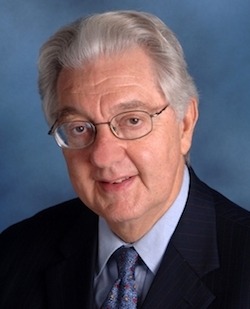
With the passing of Herbert Kleber on October 5, the field of addiction research has lost a true giant—one of its biggest thinkers as well as one of the most articulate and effective advocates for compassionate, scientifically informed treatment. It has also lost a precious part of the field’s memory, since he was literally there from the beginning.
As a newly minted young physician in 1964, Herb did his military service with the U.S. Public Health Service at its Prison Hospital in Lexington, Kentucky—better known as the “Narcotics Farm,” and the precursor to NIDA. In Lexington, he saw firsthand the failure of the then-dominant moralistic mindset to addressing drug problems—seeing drug use as social deviance and either punishing addicts or trying to change their behavior through “work therapy” or other unsuccessful methods. Following community reentry, nine out of ten patients relapsed within three months. It was clear to Herb that a science of addiction was needed to replace the prejudices and ignorance of the past and to inform more compassionate and psychiatrically informed treatments.
Although he intended to pursue a more standard psychiatric career after returning to Yale University in 1966, friends, colleagues, and strangers looking for help for their addicted patients or children sought him out as an addiction expert, and he realized that he was being called to continue the work he had begun at Lexington. In New Haven, he braved the resistance of many in his profession and in the recovery world in advocating and practicing community-based treatment and the use of methadone for people addicted to opioids. He was also one of the pioneers in the use of the opioid antagonist naltrexone for the treatment of opioid addiction. These medications are still two of the mainstays of effective opioid addiction treatment.
In 1989, Herb was invited to serve as Deputy Director for Demand Reduction at the White House Office of National Drug Control Policy (ONDCP) under the first Bush Administration. He used his position to help create policies that expanded drug education, prevention, and treatment. For example, NIDA had come under fire by the Reagan administration for supporting methadone treatment, so the ONDCP issued a white paper scientifically supporting the use of methadone to treat addiction, winning legitimacy for an approach that was still widely seen, both in Washington and in the wider world, as substituting a new addiction for an old one. Herb and his ONDCP colleagues also expanded the scope of two of the most important data sources used by epidemiologists in our field, NIDA’s annual Monitoring the Future survey of adolescents and the annual Household Survey (now the National Survey of Drug Use and Health), conducted by the Substance Abuse and Mental Health Services Administration.
However, Herb became increasingly frustrated that the money needed to prevent and treat drug problems was still mostly going to law enforcement. So Herb left the ONDCP after two and a half years to go to Columbia University, where along with his wife Dr. Marian Fischman he founded the Substance Abuse Division in the Department of Psychiatry. His research at Columbia in the 1990s included important studies establishing the reality of marijuana dependence as well as some of the pioneering research on buprenorphine that led ultimately to its approval for treating opioid addiction in 2002. At Columbia, Herb also co-founded the National Center on Addiction and Substance Abuse (CASA) with Joseph Califano.
Although Herb’s career includes innumerable scientific and policy achievements, he told addiction historian William White that he felt his major contribution was his legacy of mentorship—younger generations of researchers carrying on his work and his passion. Everyone who is in the addiction field has been touched by his wisdom, his generosity, and his warmth. Like many others who knew him, I will miss not only his valuable advice but also his generous friendship.